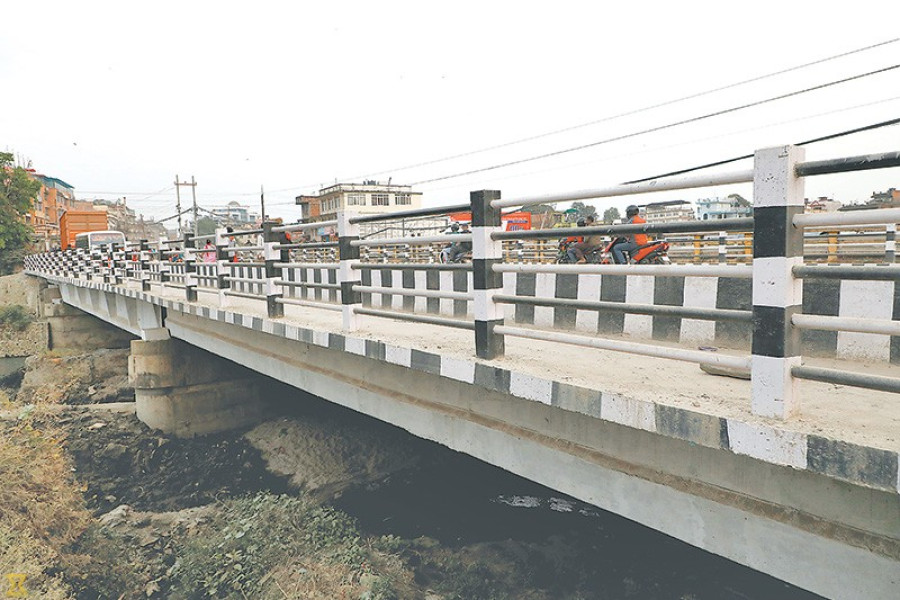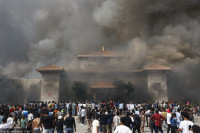Kathmandu
Road department rejects the recommendation for load test on Rs200 million bridge built by Pappu Construction in Teku
The dispute between the department and the contractor erupted after the department refused to accept the bridge, terming the structure as substandard.
Prithvi Man Shrestha
The Department of Roads has rejected the recommendation of the Board of Dispute on defective construction of a Rs200 million bridge on Bishnumati river in Teku, built by the controversial contractor—Pappu Construction.
Kailash Shrestha, chief of Kathmandu Road Division, told the Post that a single-person board under Sanjeev Koirala had suggested that the department take ownership of the abandoned 62-metre bridge after conducting a load test.
Read: Department of Roads refuses to accept new bridge over Bishnumati
Shrestha said that the dispute board didn’t have the mandate to certify the quality of the bridge.
“The dispute board was formed to settle the issue related to the seizure of performance bond by the department, but instead, it recommended load testing on the bridge,” said Shrestha, citing the reason why Koirala’s recommendation was rejected.
Read: Pappu Construction has billions in contracts—and little work to show
The dispute between the department and the contractor erupted after the department refused to accept the bridge, terming the structure as substandard. The bridge, which was completed in July last year, has remained unused.
After the department confiscated the performance bond put up by the contractor, Pappu Construction sought a legal remedy which led to the formation of the Board of Dispute.
The Post’s efforts to contact Hari Narayan Rauniyar, suspended lawmaker and owner of Pappu Construction and his son Sumit, were in vain as their mobile phones had been switched off.
Long before the issue went to the dispute board, the contractor had been asking the department for the load test, while assuring that the bridge would be re-built if it failed the load test.
But the department had said that the issue was not only about the bridge withstanding the load, but also of design violation. The contractor, according to the department, had not followed the design approved by the consultant.
The design required a cable with a 15.7mm diametre but the contractor used a 15.2mm cable. The contractor claimed that cable having low diametre was used because of unavailability of thick cable.
In fact, the consultant had sought details of the construction materials used, and their source and quality from the contractor, according to the department officials.
But the contractor—ZIEC-Pappu JV— had carried on with the works on the bridge regardless, refusing to share the details. The refusal of the contractor forced the consultant to test the samples at the lab of the Institute of Engineering, Tribhuvan University.
The test found the cable to be thinner than the approved design. Thereon, the authorities immediately asked the contractor to stop further work on the bridge.
Instead of stopping the work, Pappu constructed the pre-stress concrete girder and jacking of cable wire without meeting the specified requirements, according to the department.
It is not the only project where Pappu faces accusation of substandard construction. Last year on August 6, the Commission for Investigation of Abuse of Authority had registered a corruption case against the Rauniyars for building a substandard bridge over the Babai river in Jabbighat following which the elder Rauniyar was suspended as a lawmaker as per law.
Likewise, Kathmandu Valley Road Expansion Project had ordered Pappu Construction to dismantle the under-construction structure of Tinkune based bridge after the Parliamentary Development and Technology Committee discovered that the construction company had built a “substandard underground structure” for the bridge.
Additionally, the House committee in July this year found that the two piles out of 16 in the foundation on the Tinkune side of the bridge had cracked in a technical test. Piles are long concrete poles that support a bridge. They are hammered into the ground until they reach a hard rock or soil layer.
As well, last year, a committee formed by the Ministry of Physical Infrastructure and Transport had found defects in the Babai bridge in Bardiya, Lalbakaiya bridge in Rautahat, Kamala bridge in Sindhuli, and Ratu bridge in Mahottari, after examining as many as seven bridge projects awarded to Pappu Construction.
RELATED STORIES:
- Amended public procurement regulation may lead to summary termination of contracts
- Procurement monitoring office blacklist 47 firms in 11 months of current fiscal year




 20.12°C Kathmandu
20.12°C Kathmandu










